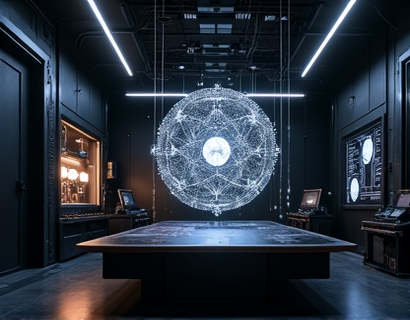E-Commerce Tailored for Artistic Success: Streamlining Growth and Management for Artists and Galleries
In the digital age, the intersection of art and e-commerce has opened new avenues for artists and galleries to reach a global audience, manage their businesses more efficiently, and foster community engagement. Specialized e-commerce solutions designed specifically for the art sector are revolutionizing the way creative professionals operate. These platforms are not just about selling art online; they are comprehensive tools that streamline operations, enhance online presence, and support the unique needs of artists and galleries. This article delves into how these tailored e-commerce solutions can transform the art business, enabling artists and galleries to focus on their craft while expertly managing growth and complexity.
Understanding the Unique Challenges of Art E-Commerce
The art market is distinct from other e-commerce sectors due to the intrinsic value of art pieces, the importance of visual presentation, and the need for a trusted and curated shopping experience. Traditional e-commerce platforms often fall short in addressing these specific requirements. Artists and galleries face challenges such as showcasing high-resolution images of artworks, providing detailed descriptions, handling secure transactions, and building a community around their brand. A specialized e-commerce solution for the art sector addresses these challenges head-on, offering features that cater to the unique needs of the art community.
Streamlining Operations with Specialized E-Commerce Solutions
One of the primary benefits of using an e-commerce platform tailored for artists and galleries is the streamlined operation it provides. These platforms are designed to simplify the management of an online art store, from setting up the storefront to handling orders and customer service. For instance, automated inventory management ensures that artists and galleries can keep track of their stock levels in real-time, preventing overselling and ensuring that customers are informed about availability. This level of efficiency allows artists to focus on creating new works rather than getting bogged down by administrative tasks.
Additionally, these platforms often integrate with accounting and payment processing systems, further reducing the overhead associated with managing an online business. By automating routine tasks, artists and galleries can allocate more time to creative pursuits and strategic growth initiatives. The ability to manage multiple aspects of the business from a single, user-friendly interface is a game-changer for those looking to scale their operations without sacrificing quality or control.
Enhancing Online Presence through Customizable Storefronts
A strong online presence is crucial for artists and galleries to attract and retain customers. Specialized e-commerce solutions offer customizable storefronts that reflect the unique brand and aesthetic of each artist or gallery. These platforms provide a range of templates and design tools that allow users to create a visually appealing and professional online space. High-quality images and detailed artwork descriptions are essential for online sales, and these platforms ensure that artworks are presented in the best possible light.
Moreover, these platforms often include SEO optimization tools, helping artists and galleries improve their search engine rankings and reach a broader audience. By optimizing product listings with relevant keywords, meta descriptions, and alt text for images, these solutions enhance visibility and drive organic traffic to the online store. This focus on online presence is vital in a market where potential buyers can discover and purchase art from anywhere in the world.
Fostering Community Engagement and Building Loyalty
Building a community around an art brand is essential for long-term success. Specialized e-commerce solutions facilitate community engagement through various features that go beyond mere transactional interactions. For example, these platforms often include blogging capabilities, allowing artists to share their creative processes, insights, and behind-the-scenes content. This not only humanizes the brand but also provides value to visitors, encouraging them to return and engage more deeply.
Social media integration is another key feature, enabling artists and galleries to share their content across multiple platforms and drive traffic back to their online store. By fostering a community through regular updates, interactive content, and personalized communication, these platforms help build a loyal customer base. Email newsletters and exclusive offers can further strengthen this relationship, keeping customers informed about new arrivals, events, and special promotions.
Managing Complexity with Advanced Features
Running an art business involves managing a complex array of tasks, from artist relationships to legal and tax considerations. Specialized e-commerce solutions address these complexities with advanced features designed to simplify the process. For instance, contract management tools can help streamline agreements with artists, ensuring that all terms are clearly outlined and easily accessible. This reduces the risk of misunderstandings and ensures a smooth working relationship.
Additionally, these platforms often provide resources and support for navigating the legal and tax aspects of running an art business. Access to expert advice, templates, and checklists can be invaluable for artists and galleries navigating these often-complicated areas. By offering comprehensive support, these solutions help users focus on their core activities while ensuring that all administrative aspects are handled efficiently.
Scaling Your Art Business with Flexibility and Scalability
As an art business grows, the need for a scalable e-commerce solution becomes paramount. Specialized platforms are designed to accommodate businesses of all sizes, from emerging artists to established galleries with extensive collections. These solutions offer scalable pricing models, allowing users to upgrade their plans as their business evolves. This flexibility ensures that artists and galleries can access the features they need without being locked into a rigid structure.
Furthermore, these platforms often provide multi-store capabilities, enabling artists to manage multiple online stores or participate in virtual art fairs and markets. This versatility is crucial for reaching diverse audiences and exploring different sales channels. Whether expanding to new markets or launching additional product lines, these solutions provide the necessary tools to support growth and adapt to changing business needs.
Conclusion
In conclusion, specialized e-commerce solutions tailored for artists and galleries are transforming the way creative professionals manage their businesses and grow their brands. By streamlining operations, enhancing online presence, fostering community engagement, and providing advanced features for managing complexity, these platforms empower artists and galleries to focus on what they do best: creating art. As the digital landscape continues to evolve, embracing a specialized e-commerce solution can be a strategic move for any artist or gallery looking to thrive in the modern art market.










































